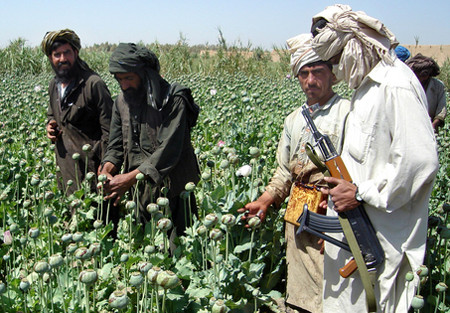By Mohammad Reza Gulkohi
The government claims hundreds of arrests and destruction of opium fields but it has not even slightly dented the alarming growth in narcotics trade.
An October report of the government and UNODC (UN Office on Drugs and Crime) announced a 43 percent increase in drug production. Last week, the ministry of counter narcotics (under the interior ministry) reported a 95 percent increase in the detection rate.
Baz Mohammad Ahmadi, deputy minister for counter narcotics, said at a press conference that 200 tonnes of narcotics was confiscated and burnt in Sayed Karam district, Paktia province. Moreover, 44 factories producing narcotics including heroin were destroyed. Unfortunately, most of those tracked down are small producers of opium and drugs – cogs in the multibillion-dollar smuggling operations – the big producers and traffickers remain untouched.
Chaman Shah Etemadi, member of a parliamentary counter narcotics and liquors commission says, “Unemployment, poverty and lack of awareness about the perils of addiction are reasons why farmers grow opium.”

One such farmer in Helmand province, Gulabudin, told Killid, “I could not have continued to support my family without the cultivation of opium. Also, smugglers coerced me, threatening to kill me and my family.”
Opium farming has returned to areas where the security situation has deteriorated. Ali Reza Hasani, lecturer at Gherjistan private university says, “Narcotics has a deep relationship with insecurity, and it has expanded in areas that are insecure. Ensuring security would be one of the ways of tackling the problem since where there is security it is possible to implement the law.”
Earlier, Salamat Azimi, the minister of counter narcotics, targeted insecurity as a reason for the 43 percent increase in narcotics production this year. Also, Zohoor Husaini, a social scientist, says apart from war and insecurity there are other factors.
Farmers are ready to plant opium because it has an assured market. The government has been pushing the cultivation of saffron, the world’s most expensive spice. But this is only in areas under its control.
Economist Hamid Karimi says, “In principle, the alternative cultivation of opium should be something that can compensate the losses of farmers. Cultivation of plants such as saffron that has a good price and good expected yields should be supported. Also, farmers should be taught the benefits of saffron.”
Administrative corruption
Widespread administrative corruption has meant farmers are forced to pay bribes to be allowed to cultivate opium. Masoud Husaini, a university lecturer thinks there is no will to counter narcotics. Government authorities make money through corruption, he says. There are people in both the previous and current government, and also individuals in the international community, who are involved, he says. No names were given.
Narcotics is produced in many provinces including Helmand, Farah, Uruzgan and Kandahar, and government authorities are alleged to be involved. Etemadi, member of the parliamentary commission, who shares the view adds, “We have done everything possible but have got fewer and fewer results because there is little interest in fighting the challenge from traffickers. The ministry of counter narcotics has spent a billion dollars on countering narcotics, but when the profits from the business is worth an annual 70 billion USD, I think there is little we can do. It is an international issue and needs to be countered globally.”
Shekeba Shaker, a civil society activist also calls for regional and international action to stop opium cultivation and drug production in Afghanistan. Until that happens, she says, Afghanistan will continue to suffer from the problems of an addicted population including youth and women, insecurity and disrepute for the nation.



